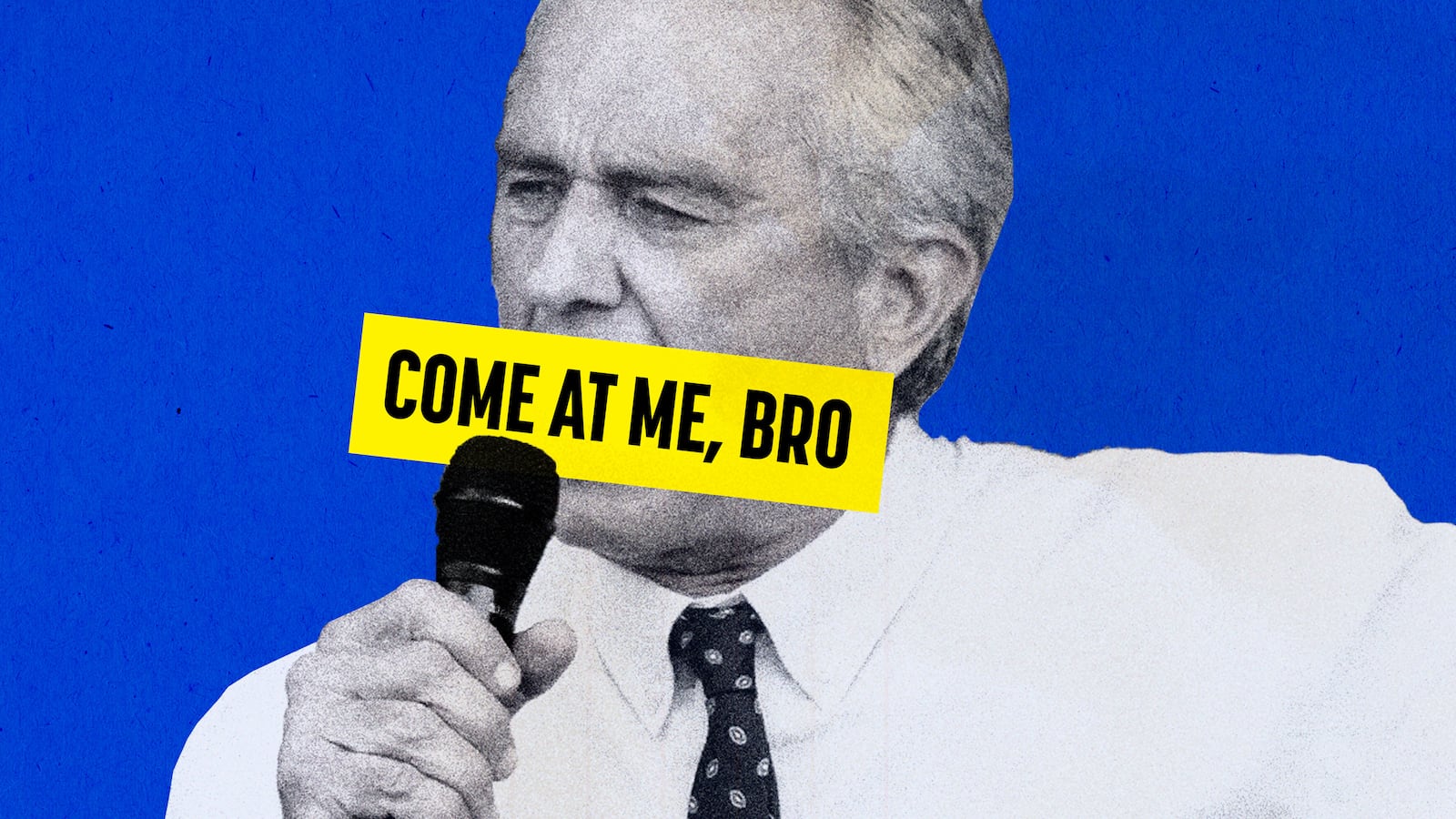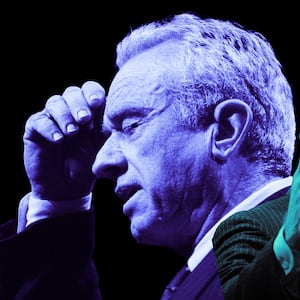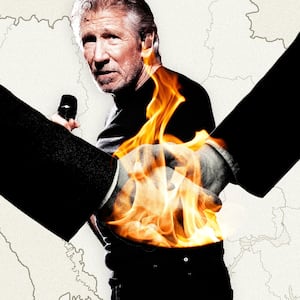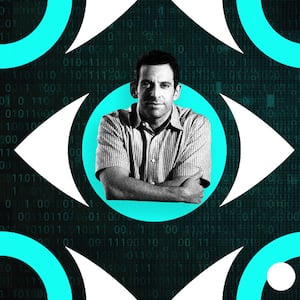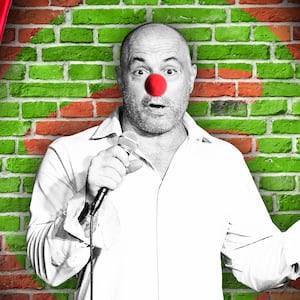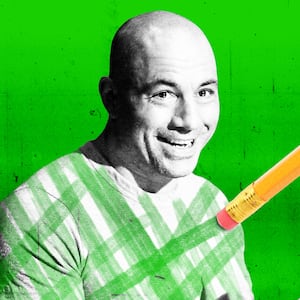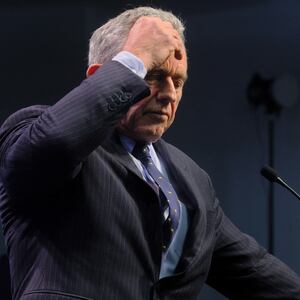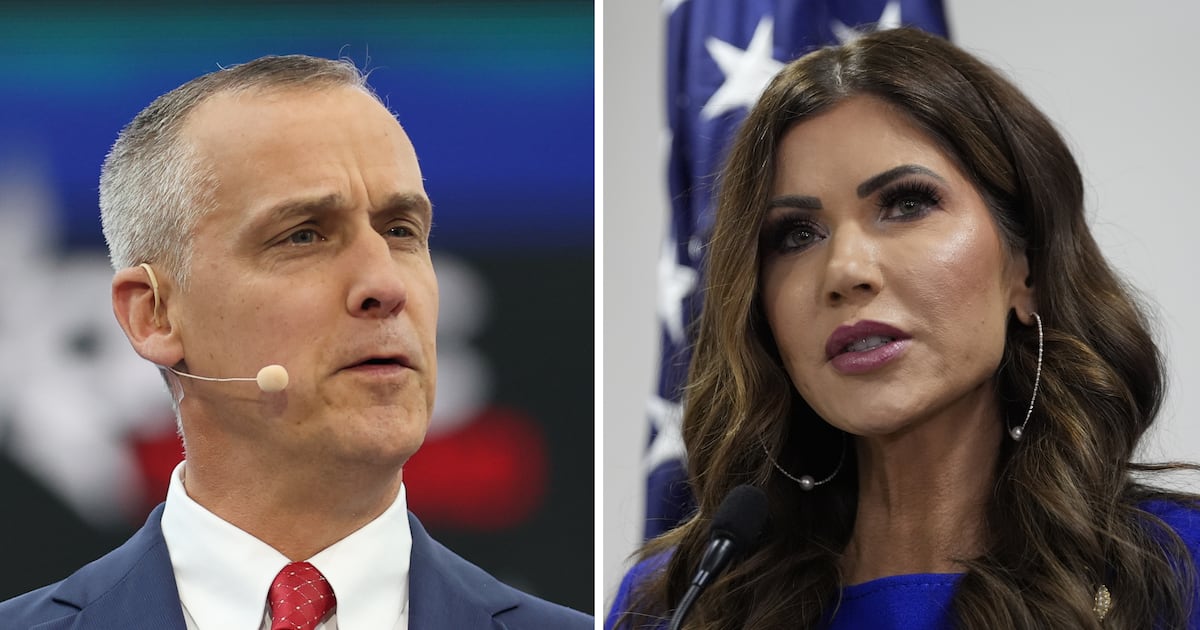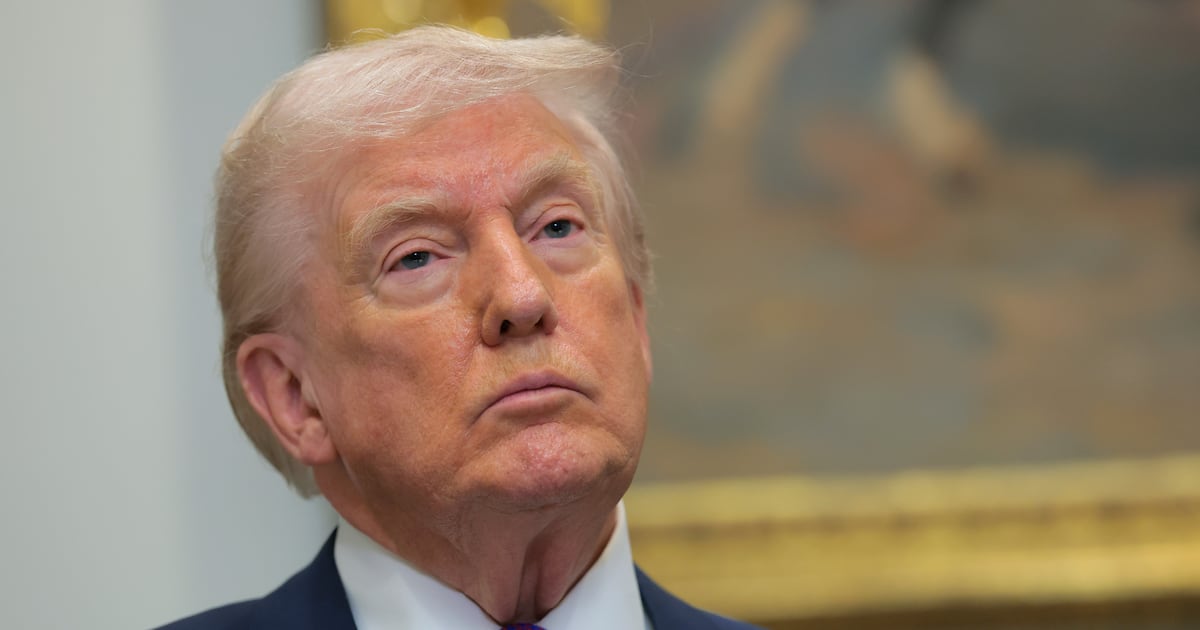Superstar podcaster Joe Rogan has invited vaccine scientist (and Daily Beast columnist) Peter Hotez to come on his podcast and debate presidential candidate and vaccine “skeptic” Robert F. Kennedy, Jr.
I think Hotez should do it.
It all started last Saturday, when Hotez took to Twitter to signal boost a Vice post about Kennedy’s recent appearance on The Joe Rogan Experience. The article called the episode an “orgy of unchecked vaccine misinformation.” Rogan responded by offering Hotez, who himself appeared on Rogan’s podcast back in April 2020, “$100,000.00 to the charity of your choice” if he agreed to a no-time-limit debate with RFK, Jr.
Kennedy is up for it. Hotez has said that he’d be happy to come back on the show to chat with Rogan one-on-one, but he’s ruled out a debate with RFK, Jr. In a conversation with MSNBC’s Medhi Hasan, Hotez said that a debate with Kennedy on JRE would be like a “Jerry Springer episode.” Hasan said it would be like “a historian of World War II debating a Holocaust denier.” Debates between “experts and cranks,” Hasan said, can only “elevate the cranks.”
I’m not a fan of Robert F. Kennedy, Jr., to put it mildly. And I’m in agreement with Hotez and Hasan on the value of vaccines in general and COVID vaccination in particular. I’m triple-vaxxed and if the CDC ever recommends that people in my age group get a fourth, fifth, or six shot, I’ll get those too. But I think what we can call the Hasan Rule—experts shouldn’t debate cranks—is profoundly misguided.
Expertise, Democracy, and Debate
In a democracy, it matters what the public thinks about matters of public health. It should matter. It’s important that policy debates be undergirded by a correct understanding of the underlying facts.
Think about controversies over the extent to which it’s legitimate for government policy to prod people into getting vaccinated. On some level, what’s at issue is how to balance individual autonomy against the health risks of widespread vaccine refusal. It’s important that people have a good understanding of what those risks are before we ask them to weigh the competing values.
If a large chunk of the public is in the grip of mistaken ideas about these issues, part of the job of experts is to wade in and correct those ideas. Sometimes that means getting your hands dirty by engaging directly with people you might not like or respect.
Not every scientist is going to be a gifted scientific communicator, of course. Some people who do amazing work in their labs are barely capable of explaining to their relatives what it is that they do for a living. But that actually makes it more important that people like Hotez, who combine scientific expertise with a flair for communicating to the public, not shun debates with influential anti-vaxxers.
Someone’s got to do it—and if not them, who?

Robert F. Kennedy Jr. delivers a speech announcing his candidacy for the Democratic presidential nomination in Boston, Massachusetts in April.
Brian Snyder/ReutersThe Value of Debate
It's true that Kennedy himself, who at his most unhinged moments uses the word “they” a lot and drops dark hints about 5G, isn’t likely to be convinced by anything Hotez told him. But the point of a public debate is almost never to persuade the person you’re talking to. That’s not a psychologically realistic goal. It’s to convince the convincible portion of the audience.
Hotez clearly sees convincing them as part of his mission. He often appears on cable television to talk about these issues, for example, and even wrote a book devoted to debunking the claim that vaccines cause autism.
Those who accept the Hasan Rule often point out that scientific truth isn’t decided by the outcome of public debates, and that the sort of debates researchers have with one another in the pages of peer-reviewed journals are very different from the sort of debate you might have on a podcast for an audience of millions of laymen. That’s all true. But none of it really has anything to do with why it’s important to directly engage with people like Robert F. Kennedy, Jr.
Hasan says that historians of World War II shouldn’t debate Holocaust deniers. Fair enough. As things stand, Holocaust denial is a fringe position, so there’s no particular reason for real historians to have to engage with it. But imagine a world where Holocaust denial was so popular that state legislatures around the country were debating proposals to remove any mention of the Holocaust from the World War II chapters of textbooks. In a world like that, I would want historians—or at least those historians with the requisite skills in communicating to a general audience—to debate the deniers every chance they got to expose their terrible arguments and educate anyone who was still educable.
It's far from an exact analogy, but anti-vaccine views are already too popular for there to be any point in holding out hope, in June 2023, that these views will go away if scientists refuse to “elevate” anti-vaxxers by talking to them.

Kennedy Jr. speaks to a crowd of supporters outside New York State Supreme Court after a hearing challenging the constitutionality of the NY State Legislature's repeal of the religious exemption to vaccination in Albany in 2019.
Mike Segar/Reuters“Just trust us and don’t ask for details” is clearly not a winning strategy. Nor is anyone likely to be influenced by Kennedy likely to start reading articles written for specialists in peer-reviewed journals. A great many of them are unlikely to even tune in to see Peter Hotez on MSBNC. But they might very well watch him on Joe Rogan.
This is an underappreciated part of the value of debate. We live at a time when everyone can curate their own media diet a la carte. Everyone from libertarians to socialists to Trumpian populists can find an endless stream of content they find ideologically congenial. In such an environment, opportunities to talk directly to someone else’s audience are rare and precious.
What a Hotez-Kennedy Debate Could Look Like
I don’t actually think that a Rogan-hosted debate between Hotez and Kennedy would be very much like a Jerry Springer episode. I’ve been on Rogan’s show. We agreed on some issues (like Medicare for All) and disagreed on others (like whether Jeff Bezos’s wealth is legitimate) and his demeanor was calm and curious the whole time. I’m guessing that Hotez had a similar experience, since he’s willing to come back on the show—though not with Kennedy.
Does Hotez think Kennedy will act like a Jerry Springer guest—for example, by starting a fist fight on stage? Or even by standing up and yelling? If so, that would be a huge rhetorical win for Hotez and a disaster for Kennedy’s presidential campaign. But I suspect that Kennedy—though often ridiculous in rhetoric—would demonstrate his more reasonable, toned-down face in a debate with Hotez. Still, there’s no reason Hotez couldn’t quote some of Kennedy’s most deranged and false statements back at him and show the viewing audience an indelible image of Kennedy squirming as he tries to justify them.
In his book, A Letter to Liberals: Censorship and COVID: An Attack on Science and American Ideals, Kennedy says that there are “mountainous archives of peer-reviewed science supporting the efficacy of hydroxychloroquine and ivermectin” as COVID treatments. As Nathan Robinson and Lily Sanchez point out in a Current Affairs article debunking Kennedy, meta-analyses of both treatments show the opposite.
Lots of people in Rogan’s audience, especially those likely to be sympathetic to what Kennedy is saying, won’t know what a “meta-analysis” is. Fair enough! But the nice thing about the “no time limit” debate Rogan proposed is that Hotez could explain it.
Honestly, it’s not that hard to explain. He could point out, for example, that individual studies with small sample sizes often suggest all sorts of meaningless correlations. That’s why bad pop science reporting is always declaring that “studies show” that plants can think or coffee cures cancer or whatever. You get more meaningful results when you carefully analyze the results of a number of the most rigorous studies done so far.
Die-hard Kennedy fans and dyed-in-the-wool conspiracy theorists in the audience would dismiss it, but I think it would become pretty clear pretty quickly to a lot of the persuadable fence-sitters that Hotez was the one who really knew what he was talking about.
And if Kennedy tried to make a populist, “anti-corporate” argument that we should be distrustful of Big Pharma because they make so much money off vaccines, Hotez could point out the absurd double standard at play. We live in a capitalist society. What piece of human knowledge isn’t being monetized by some company somewhere?
Texas Instruments makes a lot of money based on the premise that calculators work. Should we start doubting that? Should we only trust math we can do on abacuses—so we can count the beats ourselves? If hydroxychloroquine and ivermectin were endorsed as COVID cures by the medical establishment, wouldn’t hydroxychloroquine and ivermectin manufacturers make a killing selling them?
And if Kennedy’s objection to science really hinged on its being a source of profits to the pharmaceutical industry, why did he reject out of hand journalist Krystal Ball’s suggestion to him that the government cut out the profit-seeking middlemen by manufacturing pharmaceuticals itself? It’s hard to see how Kennedy could answer some of these questions without showing anyone with a remotely open mind that the “anti-corporate” framing is a superficial evasion of the real issue.
I’m under no illusions that the most hardcore vaccine skeptics in the audience would be won over. But some skeptical-leading audience members would be—and many of them are never going to track down Hotez’s book or tune in to watch him on MSNBC. Meanwhile, his refusal to do the debate, and the attitude of many of his colleagues who’ve cheered on that refusal, is a massive rhetorical gift to the RFK, Jr.s of the world. It lets them paint “establishment” scientists as too afraid to engage. That impression does more damage by itself than anything RFK, Jr. could say in the debate.
I lack Hotez’s expertise on vaccines, so when I was on Rogan’s show last year, we only spent a minute or two talking about the subject, but in that minute or two, one of the things I pointed out is that no vaccine is one hundred percent effective. That’s not how they work. But they do work. The COVID vaccines in particular have saved a vast number of human lives in the last two years.
In other words, Hotez is right and Kennedy is wrong. And that’s exactly why Hotez should do the debate.

